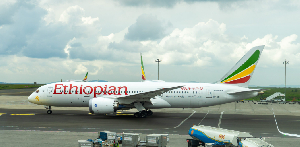Dollar-starved Ghana’s first overseas bond sale in six years received a modest response Thursday from investors who are becoming increasingly demanding in lending to African countries with shaky finances.
Ghana’s sale of $750 million in 10-year bonds attracted orders of over $2 billion, a response that’s less enthusiastic than other African countries have seen in recent months. The yield is 8%. That is a level rarely seen in dollar bonds recently and sharply higher than what Nigeria and Rwanda, two other sub-Saharan African countries, have had to pay in recent months.
The muted reaction is a sobering reminder to emerging-market countries that foreign inflows can abate as quickly as they arrived. African countries with below investment-grade debt ratings had flocked to debt markets in recent months as investors scrambled to buy assets offering higher returns. In April, at perhaps the height of the frenzy, Rwanda sold its first-ever overseas bond. It attracted bids that were more than eight times the amount the country sold. The yield was just 6.875%.
Since then, investors have become more cautious, especially given signs the U.S. Federal Reserve might pull back monetary stimulus, and emerging-market bonds have oscillated wildly. The bond Ghana issued in 2007, which matures in 2017, yielded as little as 4.7% in April. By the end of June, the yield was over 7%; it is now around 5.5%. Yields fall when prices rise.
Just a few months ago, amid the search for yield, investors were keen on Africa’s considerable growth prospects. Now, they’re troubled by its risks. Ghana has had envious economic performance–growth has averaged over 7% over the past 12 years, according to the International Monetary Fund. But frenetic public spending has opened a huge budget gap and has pushed up the government’s debt pile. Rising income has meant a hunger for imports and a consequentially large trade deficit.
The twin deficits mean the country is desperate for foreign financing. “The yield on offer reflects Ghana’s many risks,” said Mahan Namin, portfolio manager at Insparo Asset Management, a specialist Africa and Middle East asset manager, which manages $155 million in assets. “Its current-account deficit is worrying in light of low and decreasing foreign-exchange reserves, as is its fiscal deficit. The deficit is still rising and there isn’t a clear indication of how, and when, this trajectory will change.” Namin said he prefers local-currency Ghanaian debt and equities to dollar bonds.
In the local-currency market, Ghana pays more than 20% for one-year debt. Dollar bonds bear the risk that the government won’t have the foreign reserves to repay them; local bonds bear the risk that repayment is in a devalued currency. Ghana’s government will use the proceeds from the new issue to buy back some of its external and local debt, thus lowering its average borrowing cost, and fund infrastructure projects already budgeted for this year.
The timing of the bond sale, which comes during a summer lull in markets, suggests Ghana sorely needs the money. Samir Gadio, an emerging-markets strategist at Standard Bank, estimates that the country only has enough foreign-exchange reserves to pay for less than three months of imports. Still, for some investors, the yields on Ghana’s dollar bond are just too high to be ignored. By comparison, 10-year U.S. Treasurys yield 2.60%. The equivalent South African bond yields 4.30%.
“Ghana’s government is clearly making a growth bid,” said Antoon de Klerk, emerging-markets portfolio manager at Investec Asset Management. “This is a high-growth country, with all the problems that come with it, which, to be honest, are almost nice problems to have,” he added. De Klerk said he already invests in the local bond market but the high yield on offer for this dollar bond has caught his eye. BarclaysBARC.LN -0.73% and CitigroupC -0.85% are assisting Ghana in its bond issue. Ghana has a “junk” rating from the three main credit-ratings firms.
Source: WSJ http://blogs.wsj.com/moneybeat/2013/07/25/ghana-overseas-bond-sale-receives-modest-response
Business News of Saturday, 27 July 2013
Source: Wall Street Journal












